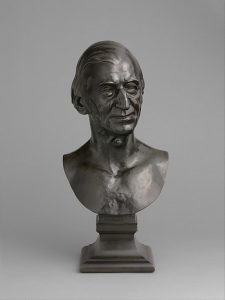Transcendentalism

Crafting a unique, well-defined American identity and an accompanying philosophy was considered an important task for authors in the United States during the 19th century. The most famous and successful of these endeavors is embodied in the works of an eclectic group of intellectuals now called transcendentalists. Their thoughts on a number of topics have helped to create what many conceive as the essential American spirit, especially those regarding nature and the role of the individual in society.
A common topic in transcendentalist literature is the conception of nature as a pathway to intense, spiritual experiences. Transcendentalism is often thought of as a branch of Romanticism due to the romantic nature of this idea. Ralph Waldo Emerson, often credited as the father of the transcendentalist movement, wrote that while standing in nature “all mean egotism vanishes. I become a transparent eyeball. I am nothing. I see all” (Emerson 217). Similar tales of dramatic personal transformation brought about by experiencing nature first-hand are common throughout transcendentalist literature. The idea that engulfing oneself in nature could bring about a deeper understanding of the world, as Emerson describes here, is essential to the transcendentalist conception of nature as a transformative agent.
Another defining feature of transcendentalist thought is the importance given to individualistic ways of thinking and living. In one of the most famous passage of American literature, Thoreau, another definitive transcendentalist writer, claimed that “The mass of men lead lives of quiet desperation” (Thoreau 984) because they think that they have no choice but to live ordinary lives. In contrast to this way of living, transcendentalists typically encouraged people to live lives focused on more than just earning a living but on self-discovery and personal and intellectual growth. What separates this facet of their thought from earlier American conceptions about the value of self-improvement is that most transcendentalists did not value material wealth or material possessions. According to most transcendentalist writers, true meaning cannot be found in outward society but must be derived from the essence of one’s own self.
Both ideas today form an essential part of the American identity. Many in America still revere nature and consider excursions into it to be restorative, meaningful experiences. Additionally, the focus on individual identity as a source of meaning in life and a disdain for the repressive nature of everyday life are popular themes in American literature and media to this day. While few self-identify as transcendentalists today, the movement’s philosophy about life has a wide-reaching impact on contemporary American thought and culture.
Works Consulted
Emerson, Ralph Waldo. “Nature.” The Norton Anthology of
American Literature.. Gen. ed. Nina Baym, Robert Levine.
8th ed. Vol. A. New York:Norton, 2012. 217. Print
Thoreau, Henry David. “Walden.” The Norton Anthology of
American Literature.. Gen. ed. Nina Baym, Robert Levine. 8th
ed. Vol. A. New York: Norton, 2012. 984. Print